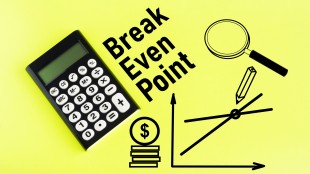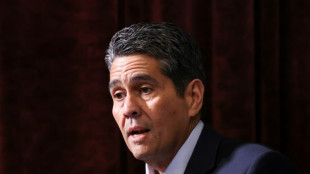
-
 Nigeria signals more strikes likely in 'joint' US operations
Nigeria signals more strikes likely in 'joint' US operations
-
Malaysia's former PM Najib convicted in 1MDB graft trial

-
 Elusive wild cat feared extinct rediscovered in Thailand
Elusive wild cat feared extinct rediscovered in Thailand
-
Japan govt approves record budget, including for defence

-
 Seoul to ease access to North Korean newspaper
Seoul to ease access to North Korean newspaper
-
History-maker Tongue wants more of the same from England attack

-
 Australia lead England by 46 after 20 wickets fall on crazy day at MCG
Australia lead England by 46 after 20 wickets fall on crazy day at MCG
-
Asia markets edge up as precious metals surge

-
 Twenty wickets fall on day one as Australia gain edge in 4th Ashes Test
Twenty wickets fall on day one as Australia gain edge in 4th Ashes Test
-
'No winner': Kosovo snap poll unlikely to end damaging deadlock

-
 Culture being strangled by Kosovo's political crisis
Culture being strangled by Kosovo's political crisis
-
Main contenders in Kosovo's snap election

-
 Australia all out for 152 as England take charge of 4th Ashes Test
Australia all out for 152 as England take charge of 4th Ashes Test
-
Boys recount 'torment' at hands of armed rebels in DR Congo

-
 Inside Chernobyl, Ukraine scrambles to repair radiation shield
Inside Chernobyl, Ukraine scrambles to repair radiation shield
-
Bondi victims honoured as Sydney-Hobart race sets sail

-
 North Korea's Kim orders factories to make more missiles in 2026
North Korea's Kim orders factories to make more missiles in 2026
-
Palladino's Atalanta on the up as Serie A leaders Inter visit

-
 Hooked on the claw: how crane games conquered Japan's arcades
Hooked on the claw: how crane games conquered Japan's arcades
-
Shanghai's elderly waltz back to the past at lunchtime dance halls

-
 Japan govt approves record 122 trillion yen budget
Japan govt approves record 122 trillion yen budget
-
US launches Christmas Day strikes on IS targets in Nigeria

-
 Australia reeling on 72-4 at lunch as England strike in 4th Ashes Test
Australia reeling on 72-4 at lunch as England strike in 4th Ashes Test
-
Too hot to handle? Searing heat looming over 2026 World Cup

-
 Packers clinch NFL playoff spot as Lions lose to Vikings
Packers clinch NFL playoff spot as Lions lose to Vikings
-
Guinea's presidential candidates hold final rallies before Sunday's vote

-
 A Christmas Message to the DEA's Diversion Anti Marijuana Cabal
A Christmas Message to the DEA's Diversion Anti Marijuana Cabal
-
QAT Community Sets QuantumTrade 5.0 for Public Beta Testing in March 2026

-
 BondwithPet Expands B2B Offering with Custom Pet Memorial Product
BondwithPet Expands B2B Offering with Custom Pet Memorial Product
-
Best Crypto IRA Companies (Rankings Released)

-
 Eon Prime Intelligent Alliance Office Unveils New Brand Identity and Completes Website Upgrade
Eon Prime Intelligent Alliance Office Unveils New Brand Identity and Completes Website Upgrade
-
Villa face Chelsea test as Premier League title race heats up

-
 Spurs extend domination of NBA-best Thunder
Spurs extend domination of NBA-best Thunder
-
Malaysia's Najib to face verdict in mega 1MDB graft trial

-
 King Charles calls for 'reconciliation' in Christmas speech
King Charles calls for 'reconciliation' in Christmas speech
-
Brazil's jailed ex-president Bolsonaro undergoes 'successful' surgery

-
 UK tech campaigner sues Trump administration over US sanctions
UK tech campaigner sues Trump administration over US sanctions
-
New Anglican leader says immigration debate dividing UK

-
 Russia says made 'proposal' to France over jailed researcher
Russia says made 'proposal' to France over jailed researcher
-
Bangladesh PM hopeful Rahman returns from exile ahead of polls

-
 Police suspect suicide bomber behind Nigeria's deadly mosque blast
Police suspect suicide bomber behind Nigeria's deadly mosque blast
-
AFCON organisers allowing fans in for free to fill empty stands: source

-
 Mali coach Saintfiet hits out at European clubs, FIFA over AFCON changes
Mali coach Saintfiet hits out at European clubs, FIFA over AFCON changes
-
Last Christians gather in ruins of Turkey's quake-hit Antakya

-
 Pope Leo condemns 'open wounds' of war in first Christmas homily
Pope Leo condemns 'open wounds' of war in first Christmas homily
-
Mogadishu votes in first local elections in decades under tight security

-
 'Starting anew': Indonesians in disaster-struck Sumatra hold Christmas mass
'Starting anew': Indonesians in disaster-struck Sumatra hold Christmas mass
-
Cambodian PM's wife attends funerals of soldiers killed in Thai border clashes

-
 Prime minister hopeful Tarique Rahman arrives in Bangladesh: party
Prime minister hopeful Tarique Rahman arrives in Bangladesh: party
-
Pacific archipelago Palau agrees to take migrants from US


European medicines watchdog rejects new Alzheimer's drug
Europe's medicines watchdog on Friday rejected a marketing request for a new Alzheimer's disease treatment, saying the risks of the medicine's side effects, including potential brain bleeding, outweighed the benefits.
The decision by the Amsterdam-based European Medicines Agency was met with dismay, but experts said effective treatment for the degenerative mental disease affecting millions in Europe alone, was getting closer.
"The CHMP recommended not granting a marketing authorisation for Leqembi, a medicine intended for the treatment of Alzheimer's disease," the European Medicines Agency said, referring to its committee for evaluating drugs for human use.
Leqembi, which was developed by US multinational Biogen and Japanese-based Eisai, is the brand name of an active substance called lecanemab, which is used to treat adults with mild memory and cognitive problems resulting from the early stages of the common type of dementia.
But the CHMP said "the observed effect of Leqembi on delaying cognitive decline does not counterbalance the risk of serious side events associated with the medicine."
"The most important safety concern with Leqembi is the frequent occurrence of amyloid-related imaging abnormalities (ARIA), a side effect, seen in brain imaging, that involves swelling and potential bleedings in the brain," the EMA said.
- 'Unmet need' -
Leqembi is a monoclonal antibody, a type of protein that clings to a substance in the brain and can delay worsening of the disease. It is given intravenously every two weeks.
Leqembi, together with another Alzheimer's drug called Aduhelm -- also developed by Biogen and Eisai -- received approval from the US Food and Drug Administration (FDA) early last year.
Both drugs were approved through an accelerated process by the FDA for drugs treating serious conditions where there is an unmet medical need.
But in late January this year, Biogen pulled the controversial Aduhelm from the market, saying it was focusing on Leqembi instead.
Preliminary data from a trial of Leqembi was released in September 2022 and found it slowed cognitive decline in Alzheimer's patients by 27 percent.
Around eight million people in the European Union live with dementia, with Alzheimer's disease accounting for more than half of these cases, according to the Alzheimer Europe website.
Eisai, in a statement, said it was "extremely disappointed with the CHMP's negative opinion".
"There is a significant unmet need for new innovative treatment options that target an underlying cause of disease progression," Eisai's chief clinical officer Lynn Kramer said.
Eisai said it would seek a re-examination of the EMA's opinion "to ensure this treatment is available for eligible people living with early Alzheimer's disease in the EU as soon as possible."
The EMA said Eisai presented a main study involving 1,795 people with early Alzheimer's who either received Leqembi or a placebo, measured over a span of 18 months.
Eisai said that the watchdog added that its refusal had "no consequences for patients in clinical trials with Leqembi".
Eisai may now ask for a re-examination within 15 days, the EMA said.
- 'Ramp up efforts' -
Experts voiced disappointment at the EMA's refusal, but added there were "reasons to remain hopeful".
"Lecanemab has shown that it is possible to slow down disease progression, and research does work," said Tara Spires-Jones, president of the British Neuroscience Association.
"Now we need to ramp up our efforts to discover new and safer treatments," she said in a statement, adding that "each discovery brings us closer to new and better treatments."
Bart De Strooper, a professor in Alzheimer's disease at the University College London called the EMA's decision "unfortunate yet not unexpected".
"This conservative approach means that patients and doctors eager to explore a proven effective drug are now denied access," he said in a statement.
"With no current therapies available, it's disheartening to think that if we had applied such caution in the past, particularly with cancer drugs and their severe side effects, we might still be without cancer treatments today," De Strooper said.
J.Oliveira--AMWN


